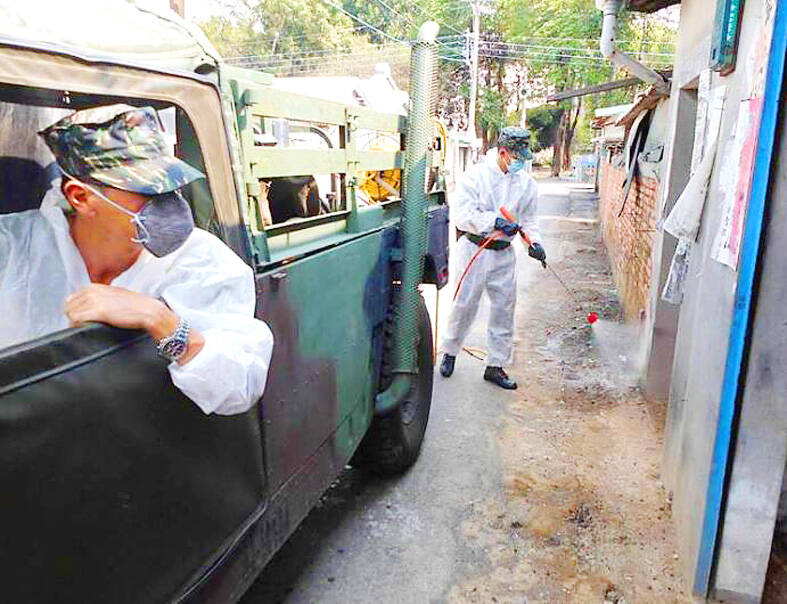The Ministry of National Defense has awarded restricted contracts worth NT$2.32 billion (US$75.47 million) to buy portable and vehicle-mounted decontamination devices to equip reserve chemical warfare troops in anticipation of their numbers being raised next year.
The Chungshan Institute of Science and Technology was awarded NT$213.4 million to provide decontamination systems to be used by light vehicles, a public contract notice dated Monday last week said.
The military previously said it aimed to obtain 194 lightweight systems.

Photo: Screen grab from the Republic of China Navy’s Facebook page
The Taoyuan-based Suitable Spring Businessman Co was awarded a NT$18.2 million contract for 960 portable decontamination systems, a separate notice posted four days prior said.
These systems are to be delivered by the end of next year, according to publicly available information.
The lightweight and portable systems are to replace the obsolete T4-84 and T4-77 systems in the reserve forces’ inventory respectively, sources said.
The replacement plan was prompted by the passing of the systems’ retirement date and difficulties in sourcing spare parts, they said.
The new decontamination systems would enhance capabilities to deal with chemical, biological, radiological and nuclear threats in the event of a war, and provide relief during pandemics in peacetime, they said.
The deal for the decontamination systems was part of a larger NT$2.6 billion budget allocation to obtain 81mm mortars, automatic grenade launchers, night vision devices and other types of equipment for reserve units.
The demand for equipment from the armed forces reserve was projected to expand as a result of the ministry’s plan to form reservist territorial defense brigades, extend refresher training to two weeks and lengthen military conscription.

A preclearance service to facilitate entry for people traveling to select airports in Japan would be available from Thursday next week to Feb. 25 at Taiwan Taoyuan International Airport, Taoyuan International Airport Corp (TIAC) said on Tuesday. The service was first made available to Taiwanese travelers throughout the winter vacation of 2024 and during the Lunar New Year holiday. In addition to flights to the Japanese cities of Hakodate, Asahikawa, Akita, Sendai, Niigata, Okayama, Takamatsu, Kumamoto and Kagoshima, the service would be available to travelers to Kobe and Oita. The service can be accessed by passengers of 15 flight routes operated by

Alain Robert, known as the "French Spider-Man," praised Alex Honnold as exceptionally well-prepared after the US climber completed a free solo ascent of Taipei 101 yesterday. Robert said Honnold's ascent of the 508m-tall skyscraper in just more than one-and-a-half hours without using safety ropes or equipment was a remarkable achievement. "This is my life," he said in an interview conducted in French, adding that he liked the feeling of being "on the edge of danger." The 63-year-old Frenchman climbed Taipei 101 using ropes in December 2004, taking about four hours to reach the top. On a one-to-10 scale of difficulty, Robert said Taipei 101

Taiwanese and US defense groups are collaborating to introduce deployable, semi-autonomous manufacturing systems for drones and components in a boost to the nation’s supply chain resilience. Taiwan’s G-Tech Optroelectronics Corp subsidiary GTOC and the US’ Aerkomm Inc on Friday announced an agreement with fellow US-based Firestorm Lab to adopt the latter’s xCell, a technology featuring 3D printers fitted in 6.1m container units. The systems enable aerial platforms and parts to be produced in high volumes from dispersed nodes capable of rapid redeployment, to minimize the risk of enemy strikes and to meet field requirements, they said. Firestorm chief technology officer Ian Muceus said

MORE FALL: An investigation into one of Xi’s key cronies, part of a broader ‘anti-corruption’ drive, indicates that he might have a deep distrust in the military, an expert said China’s latest military purge underscores systemic risks in its shift from collective leadership to sole rule under Chinese President Xi Jinping (習近平), and could disrupt its chain of command and military capabilities, a national security official said yesterday. If decisionmaking within the Chinese Communist Party has become “irrational” under one-man rule, the Taiwan Strait and the regional situation must be approached with extreme caution, given unforeseen risks, they added. The anonymous official made the remarks as China’s Central Military Commission Vice Chairman Zhang Youxia (張又俠) and Joint Staff Department Chief of Staff Liu Zhenli (劉振立) were reportedly being investigated for suspected “serious